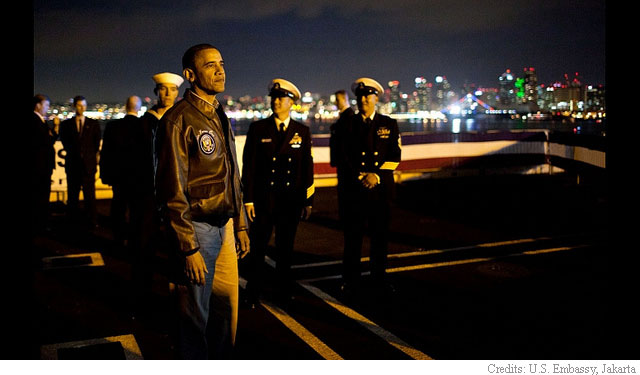
Following the news on Wednesday may have given you the unpleasant sensation of being trapped in a high-stakes game of “one of these things is not like the others.”
There was no shortage of urgent stories to consider. Paris hosted a round of difficult diplomacy aimed at halting Russia’s military incursion in Ukraine. International watchdogs waited for another tardy move from Syria toward relinquishing its chemical weapon arsenal. Sen. Mark Udall, D-Colo., seemed to suggest that President Obama knew about an audacious gambit by the CIA to spy on its own overseers in the U.S. Senate. Lawmakers and the public tried to make sense of the budget the president had released the day before, which included among its other components a proposal to cut U.S. troops by 23 percent.
And Obama visited New Britain, Conn., to stage a campaign-style rally in favor of his party’s proposal to boost the federal minimum wage, followed by a trip to Boston to help raise money for the upcoming congressional elections.
One of these things definitely, and disturbingly, does not belong.
With nearly three years remaining on his lease at 1600 Pennsylvania Avenue, the president appears to have checked out. He does not want to deal with the things that bore, frustrate or embarrass him, so he seems to have decided not to bother. He likes to campaign. He’s good at it. So that is what he does.
Granted, we live in an era of instant communications. Obama need not sit by the phone and wait for Secretary of State John Kerry to brief him on his talks with Russian officials. But our NATO allies who used to live under the Soviet thumb are justified in wondering whether they will be next if Russian President Vladimir Putin gets away with his foray into Ukraine. Other major Western powers are notably reluctant to join the United States in imposing firm and costly sanctions on Russia, which will also impose costs on our military partners. Obama should have been rallying support for a united stand against Russian adventurism.
Instead, he was playing to cameras in order to drum up support for the Democrats’ wedge issue of choice for the November campaign, intended to divert attention from the administration’s signature achievement, previously known as Obamacare. His New Britain trip included a photo-ready visit to a cafe and a barber shop, with plenty of hands to shake at each.
Yesterday, as the Russian Navy strategically scuttled an old warship to trap the Ukrainian Navy in a corner of the Black Sea and the self-installed government in Crimea announced that it was now part of Russia, Obama did manage to find about 10 minutes to appear before TV cameras and announce that “Any discussion about the future of Ukraine must include… the government of Ukraine.” The White House released a statement asserting that the U.S. was imposing visa bans against unspecified, and possibly not-yet-identified, Russians and Ukrainians it deems responsible for the attempted dismemberment of that country. None of this appeared to bring us and our allies any closer to imposing the sort of tangible costs for Russian aggression that might actually make the Kremlin behave less aggressively. This week’s action in Crimea has been about changing reality, while the action in Washington (and Connecticut) was about managing perceptions.
The emerging CIA story is arguably even more disturbing than the situation in Crimea. It is bad enough that the agency may have crossed over the line in its interrogation techniques under the prior administration (still a subject of considerable debate). Actual spying on Senate investigators would be wildly over the line, suggesting a powerful arm of the executive branch run amok. Even the idea of such a breach is sobering, and the fact that the CIA is internally reviewing agency employees’ conduct suggests that someone, at least, is taking the allegations made by members of Congress seriously.
It is hard to imagine that Obama’s previously scheduled Wednesday commitments were more important than responding to the public disclosure that such a transgression might have taken place on his watch. Yet in this president’s mind and in his White House, campaigning comes first, even after he has run his last campaign.
This is not the first time Obama has addressed problems he would like to tackle rather than the one most desperately demanding his attention, but at the moment it is a phenomenally dangerous state of affairs, as events in Crimea demonstrate. Putin does not take Obama seriously, and there is not much reason why he should. Not when the president prioritizes a pointless rally on a Connecticut college campus over trying to avert armed confrontation in Europe.
Obama may be deluding himself into believing that his studied detachment presents an aura that he is in control, the old “no-drama Obama.” The reality is that that his outward lack of concern just makes him look disconnected and ineffective. His own image is the only thing that he displays much interest in pursuing these days, and the American people aren’t the only ones who have noticed.
Democrats should be as alarmed as Republicans. I suspect many are, at least in private. The country needs a president who has his head in the game. This one seems to have forgotten that he is still on the field.
- Bulenox: Get 45% to 91% OFF ... Use Discount Code: UNO
- Risk Our Money Not Yours | Get 50% to 90% OFF ... Use Discount Code: MMBVBKSM
Disclaimer: This page contains affiliate links. If you choose to make a purchase after clicking a link, we may receive a commission at no additional cost to you. Thank you for your support!



Leave a Reply